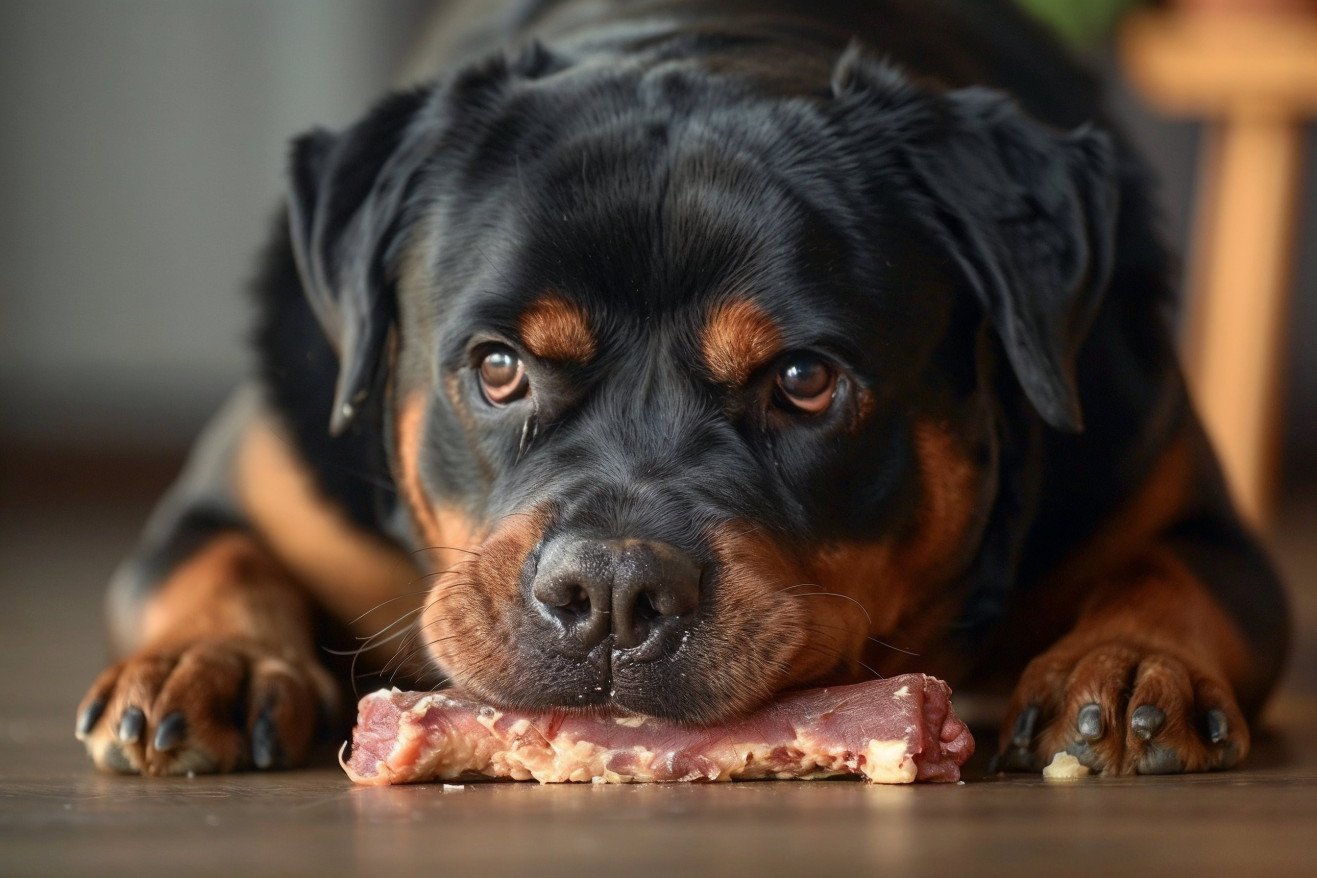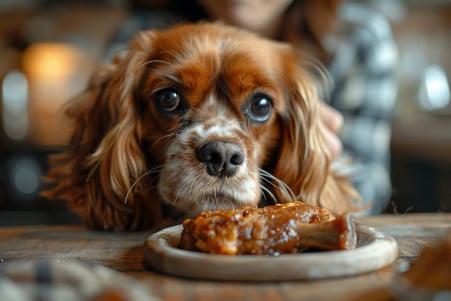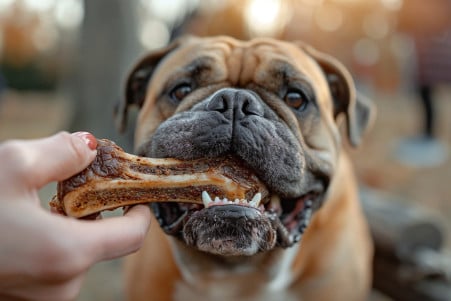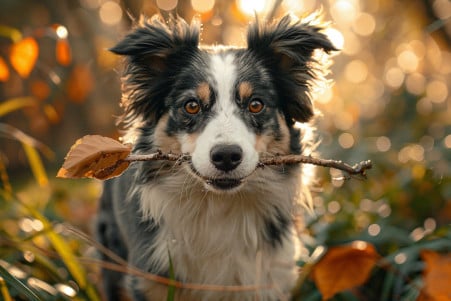Why Do Dogs Like Bones? Reasons and How to Chew Safely
16 May 2024 • Updated 15 May 2024

Dogs are naturally drawn to chewing on bones, but is this tendency good or bad for our four-legged friends? While dogs' love of bones is a holdover from their wolf ancestors, who chewed on bones to get nutrients and keep their teeth clean, the practice can be both good and bad. On the one hand, chewing on bones can help keep dogs' teeth clean, and it can also provide mental stimulation. On the other hand, chewing on hard bones can lead to dental fractures.
To better understand why dogs like bones, we'll look at research from a variety of fields, including ethology, animal behavior, veterinary medicine, and dog nutrition. This will help us understand the biological, psychological, and practical factors at play, which will help us better manage our dogs' bone-chewing habits in a way that's both safe and beneficial. We'll also look at other options that can help dogs satisfy their need to chew without the risk of dental problems or intestinal blockages.
Why do dogs like bones?
Why Do Dogs Chew?
In addition to their natural instinct to chew on bones, dogs chew for a number of other reasons. According to Bow Wow Labs, chewing helps dogs learn about new surroundings, aids in self-care during teething, and provides a way to relieve boredom and anxiety. Puppies, in particular, chew more than usual as they try to soothe the discomfort of teething when their adult teeth come in, according to the Humane Society.
Destructive chewing in adult dogs, on the other hand, is often a sign of an underlying issue like boredom, separation anxiety, or stress, according to VCA Animal Hospitals. As the ASPCA points out, chewing can help relieve boredom caused by a lack of exercise or mental stimulation, as well as help dogs relieve stress or frustration. Destructive chewing is a sign that the root cause, such as anxiety, needs to be addressed through the use of appropriate chew toys and activities.
To discourage dogs from developing problematic chewing behaviors, it's important to make sure they have access to appropriate chew toys and receive enough physical and mental stimulation. While chewing is a natural, instinctive behavior, pet parents need to be aware of when it becomes excessive and understand the motivation behind it so they can redirect the behavior in a healthy way.
How to Choose Safe Bones and Chews for Your Dog
In general, raw meat bones (like chicken, turkey, or beef) are safer than cooked bones, which can splinter easily. The Port Royal SC Vet explains that raw bones are less likely to splinter and can provide a natural source of calcium and phosphorus. Meanwhile, edible bones from smaller animals, like chicken or turkey necks and wings, are great for dental health.
For larger dogs, Redbarn Pet Products suggests recreational bones from medium-sized animals, which can provide mental stimulation and jaw exercise. However, the Animal Keeper warns that even raw bones can be dangerous if not fed correctly. It's important to always supervise your dog and separate them during chewing sessions to avoid choking or internal injuries.
If you're concerned about the risks of feeding your dog bones, synthetic bones and chews made from safe materials can provide a safe alternative. The AKC recommends considering these options, as there are many risks associated with feeding dogs bones. In the end, close supervision and selecting the right chews based on your dog's individual needs are key to ensuring that chewing is a safe and enjoyable experience.
Dental Health Benefits of Chewing for Dogs
Chewing on the right bones and chews can have a big impact on a dog's dental health. As noted in a study published in PMC, the mechanical action of chewing can help to remove plaque and tartar from a dog's teeth, which can in turn slow down the development and progression of periodontal disease.
According to Mother Nature, chewing on raw bones can act as a natural toothbrush and floss, much like humans brushing and flossing their teeth. This can help to keep teeth and gums healthy by scraping away plaque.
Dental chews and treats that have been approved by the Veterinary Oral Health Council (VOHC) can also be very effective at reducing plaque and calculus, according to WebMD Pets. Chewing on VOHC-approved products regularly can reduce harmful oral bacteria, which can lead to healthier gums and fresher breath.
Making sure that chewing is part of a dog's daily routine is important for dental health and can help prevent problems like periodontal disease. As noted by Fetch! Pet Care, chewing on hard objects can help to prevent tartar build-up and keep teeth clean.
More Reasons Why Dogs Chew
In addition to the dental benefits of chewing on bones and other safe chew toys, there are other reasons why dogs enjoy this activity. According to Pet Evolution, chewing can help dogs satisfy their natural instincts, which can help keep them mentally healthy and engaged. It can also help dogs meet their need for enrichment. In fact, the repetitive nature of chewing on a bone can be soothing and even help dogs relieve stress and anxiety.
For puppies, chewing on chew toys can help relieve the pain and discomfort of teething, as the Humane Society points out. Chewing can also help ensure that adult teeth grow in properly and can help puppies learn to manage the discomfort of teething in a healthy way.
Moreover, BetterBone explains that chewing can help dogs exercise their jaw muscles, which can help support overall oral health and function. Some chew treats may also include ingredients that can help with digestion and offer other health benefits.
While chewing can help support good dental health, it can also help dogs in many other ways, from mental stimulation and stress relief to healthy development and nutrition. Recognizing these other benefits of chewing can help dog owners make sure they're meeting all of their pets' needs.
Safe Bone and Chew Habits for Dog Owners
If you're a dog owner who wants to give your pet bones and chews in a safe way, it's important to make sure you're always there to supervise and that you're using safe habits. Redbarn Pet Products notes that supervision is key to making sure that your dog doesn't choke or develop an intestinal blockage when they're chewing on a bone or a chew. You should also make sure to limit the amount of time that your dog spends chewing and take the bone or chew away when it gets too small or worn down.
You should never give your dog cooked bones, as the AKC points out that they can splinter and cause internal injuries if they're swallowed. Instead, make sure to choose chews that are appropriate for your dog's size, age, and chewing style. Preventive Vet notes that even raw bones can be dangerous and that you should be careful when giving them to your dog.
While chewing is a good thing to include in your dog's daily routine, it's important to make sure that it's balanced with plenty of exercise and mental stimulation. However, if you're careful, you can make sure that you're satisfying your dog's natural urge to chew in a way that's safe and that promotes their overall health and well-being.
Conclusion: Understanding the Natural Reasons for Dogs' Chewing Behavior
The reason dogs love bones is that they satisfy the ancestral urge to chew and get nutrients. Chewing on the right bones and chews can offer dogs dental, mental, and physical benefits. However, pet parents need to make sure they're choosing safe products and monitoring their dogs to avoid potential hazards.
Making sure dogs have opportunities to chew can be a great way to enhance their lives and make sure they're getting their needs met. Understanding the reasons for dogs' chewing behavior can help pet parents make sure they're doing just that.


